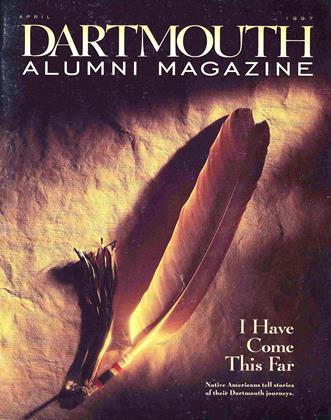Ihave been dancing hula for as long as I can remember. But I didn't realize whar a part of my life dancing and movement were until I danced my first hula at Dartmouth. I was really nervous. I had danced on stage before—that was not the problem. I worried about what people would think.
I remember the looks of wonder and confusion when people saw me in my I costume before! went on. One person approached me and said, "Where are you from?" I told hun thai I was from Hawaii, and his eyes lit up. "You mean you are going to be doing that 'dancing' thatyou do there?" As he spoke, he lifted his hands in a half-hearted gesture, his left limply across his chest and his right limply extended, with droopy elbows and both hands dripping from "the waist. Then it hit me: most people in the room had never really seen the hula, not the way I learned it, only the grass skirt thing always shown on television. What were tbey all expecting?
My friend read the introduction for the dance:
"Hula is an ancient form of .Hawaiian expression, a communication of prayer and homage to the three central forces in life—the gods, the chiefs, and nature. Hula expresses these in a deeper and more three-dimensional way than words are able to express, because hula encompasses the five; senses. Through the hand movements, the flowers,' the costumes, and the chants, the hula gives us an entire picture that we can touch, smell, see, hear, and almost taste. Hula is the spirit, the spirit of the ancient ones and of those yet to come communicating, expressing themselves. It is now also Elizabeth's spirit expressing herself."
I remember thinking, "Hula is my spirit expressing myself," and I don't remember what happened after that. I was dancing in my own world; everything was coming out from inside of me, and I felt a huge release. Agreat outburst of applause jolted me back. Mentally and spiritually drained, all I could think was that I had completely opened myself up to all those people and how scary it had been.
People were astounded. "Liz, that was so beautiful!" they said, and "Why haven't you performed before?" Win ? I was afraid of people not understanding, of people mocking me; I was afraid of showing who I really am. lam still afraid. Each time I dance, I think, "How much should I really show?"
That was the first positive experience I had at Dartmouth.
ELIZABETH CAREY still shares herself and. Hawaii's culture through the hula. Aprofessional flamenco dancer and dance instructor in Massachusetts, she plans to become a dance therapist:
 View Full Issue
View Full Issue
More From This Issue
-
 Cover Story
Cover StoryI Have Come This Far
April 1997 By Robert A. Bennett '93 -
 Feature
FeatureNative America at Dartmouth
April 1997 By Karen Endicott -
 Cover Story
Cover StoryWhy Don't You Say Anything?"
April 1997 By Davina Begaye Two Bears '90 -
 Cover Story
Cover StoryMy Grub Box
April 1997 By Vivian Johnson '86 -
 Cover Story
Cover StoryWe Are Not Your Indians
April 1997 By Arvo Mikkanen '83 -
 Cover Story
Cover Story"You'll Know What to Do"
April 1997 By Bruce Duthu '80







